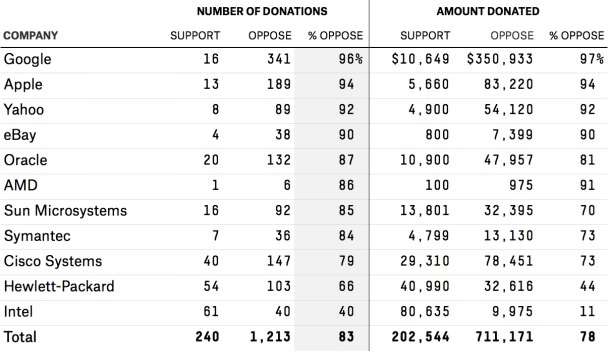Does Mozilla Dumping Its CEO Over Prop. 8/Anti-Gay-Marriage Stance = McCarthyism?
So last week, Mozilla, the mission-based makers of lagging web browser Firefox, fired its newly appointed CEO Brendan Eich after the dating site OK Cupid publicized Eich's donation to Prop. 8, a California ballot initiative that barred same-sex marriage in the Golden State.
As I wrote here and for Time:
Now that we're well past a subsistence economy, we live in a world of largely symbolic exchange, where we don't simply choose something because we're hungry or naked but because we want to make a statement about what sort of person we are, what sort of taste we possess, and what sort of values we share.
That's especially true of an organization such as Mozilla, which has feet both in the nonprofit activism and for-profit business worlds.
Conservatives - including those who support gay marriage, such as Hot Air's Allahpundit - have been howling that Eich's ouster is an ominous new form of blacklisting that seeks to discredit and silence all opposition to the "hoMOsexual agenda" (as it's often pronounced by detractors).
Nate Silver's FiveThirtyEight has generated a table of Prop. 8 donations by top Silicon Valley firms from a Los Angeles Times database:

Opponents of Prop. 8 (that is, supporters of gay marriage) were far more common among tech firms, but the opponents ponied up much more dough.
Allahpundit writes that "what the Eich case is [really] about" is stopping or halting the progress of high-profile business people who oppose marriage equality:
His donation's been a matter of public record for five years but only after he became the face of Mozilla by being named CEO was it deemed an unforgivable trespass. Prop 8 fans can continue to work in tech as long as they aren't given positions of significant influence. That's when the hammer comes down….
When do we get a list of Silicon Valley donors to Obama's campaign circa 2008, when he was still formally against traditional marriage? True, he didn't support Prop 8 or other attempts to legally ban SSM (a strong signal at the time that his stated view was a lie), but the whole point of the equal protection argument against traditional marriage laws is that you can't reserve "marriage" for straights without implicitly slapping a second-class-citizen stigma on gays. Obama was willing to do that, at least rhetorically. Let's have the names.
Regardless of the specifics of this case, I think the Eich story showcases how technology, symbolically-based economic activity, and access to information has really changed things (and generally for the better). At the same time, I share the ambivalence of many between blurring of lines between private and public activities. All businesses have things that I find objectionable from time to time. Many specific individual artists and creators have been accused of or acknowledged absolutely horrible and criminal behavior (such as Roman Polanski, Woody Allen, and Arthur Koestler). It is no simple calculation for individuals to decide when learning about such things means boycotting a given company or person. Surely, the fact that Firefox has not really been a dominant browser for years makes it easier for many pro-gay-marriage people simply to say they will continue NOT using Firefox in the wake of the Eich affair.
Here are some questions for Reason.com readers:
1. Do you think a business's personnel decisions or corporate actions should ever be a factor in deciding whether to patronize a firm? Don't we rally around banks such as BB&T when its leadership says it won't underwrite deals based on eminent domain abuse? Or Overstock.com when it fights against Internet sales tax plans?
2. Is the problem with Mozilla that it caved so quickly to OK Cupid's campaign? Many stories about Eich suggest that his Prop. 8 donation/stance was well-known within the organization and the subject of controversy. Having made the decision to promote Eich - a giant in tech innovation - is the real crime here that Mozilla didn't push back against a backlash?
3. How important is it that we're talking about the private sector rather than the public or political sector? We generally talk about how different rules can and should apply to private-sector actors than public-sector ones (quick example: Private universities are not bound by the same First Amendment legal principles as public ones are). Many critics of Eich's resignation talk about how Obama himself was against gay marriage back in 2008 and that many sitting Democratic senators still are. Is that in any way relevant?
4. Does the particular issue matter? If you found out, say, that a particular company or CEO was a massive supporter of, say, Venezuela's current strongman, or of any given cause about which you feel strongly? Is it worth mentioning that conservatives call for boycotts of Girl Scout cookies due to alleged ties of the parent org's ties to abortion?
Read Reason 24/7's deep dive on the issue.


Show Comments (196)